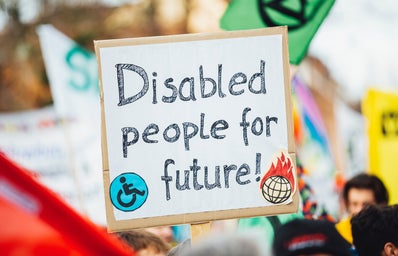On Saturday, Mar. 4, 2023, 75-year-old Judy Heumann passed away in Washington, D.C. Heumann was known to many as the “mother” of the disability movement that is going strong today.
Heumann had polio when she was 18 months old, making her paralyzed from the waist down. At five years old, she was told that her wheelchair was a fire hazard by the public school system, preventing her from joining public school; no legislation was in place to ensure she could go to school. Isle Heumann, her mother, fought for her to be able to enter a public school a couple of times a week through persistent begging to the New York public school system.
She went to Long Island University in 1965 to become a teacher. However, when she applied to be a teacher, the Board of Education for New York denied her, saying she would be a fire hazard in a school. So she started to work against the Board of Education, pushing back to advocate for disability rights with support from the disabled community. She protested with the slogan, “You Can Be President, Not Teacher, with Polio.” She then attended Berkley in the 1970s. Heumann co-founded Disabled in Action while at Berkley, a protest group for disability rights.
In 1972, Heumann, with about ten other protestors, shut down a block of New York City, blocking traffic with their wheelchairs. Section 504 was the foundation for the Americans with Disabilities Act, creating public accommodations for disabled people and ensuring no discrimination on all bases. The following year, Nixon signed the Rehabilitation Act to promote equal rights in the U.S. However, when the Carter administration took office, Section 504, which ensured that no government agency could discriminate based on a disability, wasn’t enforced.
Section 504 was the foundation for the Americans with Disabilities Act, creating public accommodations for disabled people and ensuring no discrimination on all bases. Joseph Califano, Carter’s new Department of Health, Education and Welfare secretary, appointed a task force to review all the regulations. This task force lacked representation from the disabled community, so the community wanted the Rehabilitation Act signed without any revisions from the task force. This protest led by Heumann was called the 504-sit-ins in the spring of 1977, with 26 days of protest in Califano’s office.
Heumann became more popular in 2020 due to the film Crip Camp: A Disability Revolution, featuring the history of Camp Jened and Heumann’s roots in activism and her efforts in advocating for disability rights leading to the passing of the ADA. At this time, her memoir, “Being Heumann,” which gave her perspective on growing up with her disability and becoming the world’s most-known disabled activist also came out.
Up to one in four people have a disability of some sort, as the CDC reported. This makes disabled people one of the largest minorities in the U.S., yet they are not treated as such. For many, every day is a struggle for their rights, as Heumann has highlighted. As her memoir describes, the fight to pass the ADA was a long, gut-wrenching process.
Her service was held at Adas Israel Congregation, where she regularly attended synagogue. Many who attended described that hearing the intimate stories of the connection and love between so many of her friends and family was much needed to heal the disabled community. The service included a statement from President Joe Biden that can be found here. The service was live-streamed as well, allowing many to see the procession.
Author’s Note
Learning how she embraced her title of being disabled throughout her life was extremely inspiring as someone who has not embraced a disability title for long. I could imagine her voice as I read the story about the kid who genuinely asked if she was sick; the bubble she had been in her whole life had popped. Heumann said in her book, “The world went silent as the words reverberated in my head. I couldn’t hear anything except those words.” When I hear ignorance from others about different disabilities, I feel the same way, whether it’s my disability or others’ disabilities.
Talking to Heumann about her ideas and perspectives on what can be done about Academic Support and Access Center (ASAC) and treating people was an awakening. ASAC is legally allowed not to accept a diagnosis if the diagnosis was performed when someone was under 18 and can request that a person be retested. However, no one advocates for these students who need accommodations. ASAC continues to treat people as issues rather than humans. As Heumann said, “We have to work together across disabled communities, otherwise, we don’t get anywhere.” We will all have to work together to revise this, just as Heumann did not too long ago.
To Judy,
Thank you so much for being such an amazing inspiration to me. You have blazed so many trails for me and many others. You re-ignited my passion for civil rights activism. Anyone who knew you were so grateful to have known you. You lit up rooms with your ideas and personality. It’s been highly apparent to me these past few days that we must continue to be unapologetically disabled, to embrace all you taught and loved. It’s only fitting you died on March 4 because you inspired so many to continue to march forth. Thank you again and rest in love.


